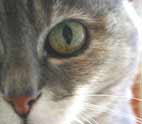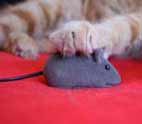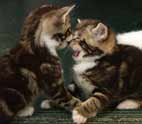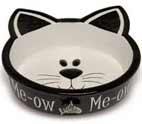Cat Dementia
Signs and Symptoms
Cat dementia is becoming increasingly common in older kitties, but the condition can be hard to diagnose. The signs and symptoms can be confused with other cat illnesses as well.
As your kitty gets a little older, you might start to worry that they are appearing a little confused.
Or perhaps they are starting to miss the litter box, wander around a bit aimlessly or cry out for no apparent reason?
On this page:
- Why Is Dementia In Cats Becoming More Common?
- What Are The Signs And Symptoms Of Feline Dementia?
- What Should I Do If I Think My Kitty May Have Dementia?
Please note that this article is for information purposes only.
If you have noticed any change in your pets behaviour or think they may be ill in any way whatsoever, please take them to see a veterinarian for a professional medical opinion as soon as possible.
Why Is Dementia In Cats Becoming More Common?
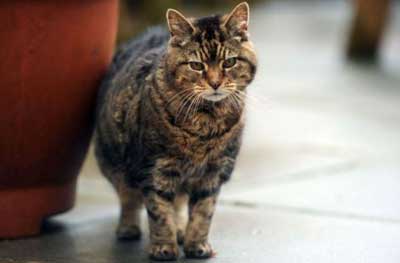
The rate of cat dementia is increasing simply because domestic cats are living longer than they used to.
Improvements in pet nutrition and veterinary medicine have lead to great improvements in the lifespan of domestic animals.
However, any increase in age does unfortunately lead to a higher risk of developing age related diseases such as feline dementia.
Dementia is basically a collection of symptoms (such as forgetfulness and confusion) caused by a deterioration in the brain.
The most common form of dementia in humans is called Alzheimer's disease and cats can develop very similar problems too.
What Are The Signs And Symptoms Of Cat Dementia?
|
IMPORTANT NOTE: Many of the signs and symptoms of dementia in cats can also be signs of other cat illnesses, such as:
... and many, many other conditions. The main thing to consider here is that we are looking for any unexplained CHANGE in behavior. For instance, if your cat has always meowed a lot at night time, or if they have always been irritable and hissy then this may be quite normal for them. But if they suddenly start behaving in ways that are new and unusual, then this could indicate that they are ill in some way. |
Helps maintain cognitive ability, energy levels and supports joint mobility and immune system |
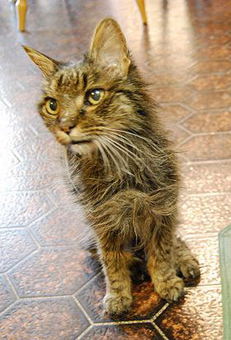 |
Just some of the possible signs and symptoms of cat dementia include:
|
- Increased agitation, aimless wandering, or constantly appearing as if they are looking for something
- Irritability, hissing or lashing out at familiar companions, or appearing scared, or not liking to be touched
- Decreased appetite - or possibly increased appetite, as if they have forgotten that they have just eaten
Can you see how some of these signs and symptoms could also indicate some other cat illnesses?
For instance, urinary problems could result from diabetes or bladder crystals. Or suddenly becoming irritable and not wanting to be picked up could indicate they are in a lot of pain, while an increase in appetite can result from an over active thyroid.
What Should I Do If I Think My Kitty May Have Feline Dementia?
Because there can be so many other cat illnesses that may be leading to the symptoms your cat is displaying, the only thing is to get them to the vets for a proper examination and diagnosis.
If you are worried about cat dementia, then:
- make list of any symptoms that you have noticed, including changes in behaviour as well as any physical symptoms
- Keep a record of when you first noticed these changes, when they tend to occur and how long they last for
- Also note down anything else that has changed recently. For instance, have there been any changes in the household that may have unsettled your cat, such as a new arrival (a new baby or other pet), a bereavement, or changes in home decoration (paint smells, building work or new furniture)
Discuss all this with your veterinarian.
Your vet should then thoroughly examine your cat and conduct any necessary tests (such as blood tests for anemia, thyroid problems or diabetes) so they can advise you properly and commence any treatment possible.
Unfortunately there may be very few treatment options if genuine cat dementia is diagnosed, but your vet can advise you about helping to support your beloved cat effectively so they may continue to live as good a quality of life as possible.
They can of course also treat any other underlying cat illnesses that may be giving rise to the distressing symptoms, such as we have discussed above.



